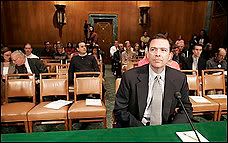Former Deputy James Comey Says Program Implemented Despite Objections
 Former Deputy Attorney General James Comey waits to testify on Capitol Hill in Washington, Tuesday, May 15, 2007, before the Senate Judiciary Committee hearing regarding the fired prosecutors. (AP Photo/Susan Walsh)
Former Deputy Attorney General James Comey waits to testify on Capitol Hill in Washington, Tuesday, May 15, 2007, before the Senate Judiciary Committee hearing regarding the fired prosecutors. (AP Photo/Susan Walsh)The Washington Post reports:
The White House three years ago briefly implemented a classified program, parts of which the Justice Department found to be illegal, overriding the objections of top department officials after failing to get a seriously ill attorney general John D. Ashcroft to sign off on it from his hospital bed, Ashcroft's former deputy told a Senate panel today.
Former deputy attorney general James B. Comey testified under oath that Alberto R. Gonzales and Andrew H. Card Jr., at the time President Bush's White House counsel and chief of staff respectively, went to see Ashcroft in intensive care at George Washington University Hospital in March 2004 in an effort to "do an end run" around Comey, who was then acting attorney general, and obtain recertification of the highly sensitive program. Under the presidential directive then in effect, the legality of the program was to be certified by the Justice Department every 45 days.
Comey declined to identify the program, but members of the Senate Judiciary Committee indicated at today's hearing that it was the National Security Agency's controversial warrantless eavesdropping effort that the White House called the "terrorist surveillance program."
The secret program was authorized by Bush shortly after the Sept. 11, 2001, terrorist attacks to monitor communications between suspects abroad and persons in the United States without obtaining warrants from a special court under provisions of the Foreign Intelligence Surveillance Act. The program came to light in late 2005.
In January, Gonzales, who succeeded Ashcroft as attorney general in February 2005, informed the Senate that Bush would not reauthorize the program but would submit electronic surveillance requests for approval by the Foreign Intelligence Surveillance Court.
In his testimony today, Comey described publicly for the first time the tense confrontation between the White House and the Justice Department over the program in 2004, a dispute that he said was settled when Bush was confronted with the imminent prospect of mass resignations, including those of Ashcroft and Comey.
He said he had been angered by the visit of Gonzales and Card to Ashcroft's hospital room after the Justice Department had refused to recertify the program for reasons that he declined to explain publicly.
"I was very upset," Comey told the committee. "I was angry. I thought I just witnessed an effort to take advantage of a very sick man, who did not have the powers of the attorney general because they had been transferred to me."
The testimony appeared to add more fuel to calls for the resignation of Gonzales, who is under fire for the controversial dismissals last year of nine U.S. attorneys. At today's hearing, Sen. Arlen Specter (R-Pa.), the only Republican present, joined Democrats in saying he was troubled by the testimony and that he thought Gonzales should step down.